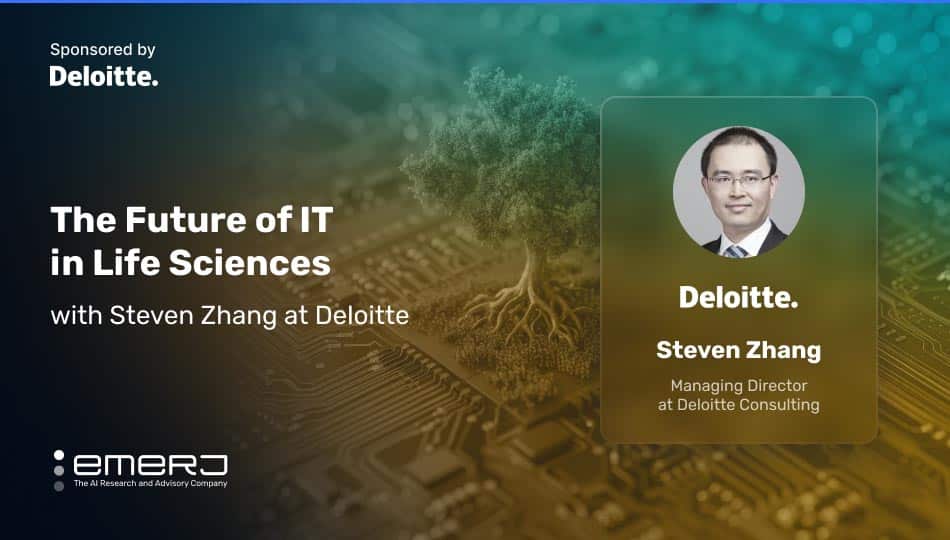
This interview analysis is sponsored by Deloitte and was written, edited, and published in alignment with our Emerj sponsored content guidelines. Learn more about our thought leadership and content creation services on our Emerj Media Services page.
As generative AI continues to revolutionize the life sciences, the imperative for properly scaling infrastructure and IT operations cannot be overstated. While the focus here is on life sciences, the scalability principles discussed are universally applicable across industries, underscoring the foundational role of robust IT frameworks in harnessing AI’s transformative potential.
Deloitte’s State of Generative AI survey in the Enterprise- Quarter one report for 2024 reveals that 31 percent of the leaders surveyed expect a substantial transformation in less than one year with GenAI adoption. It also shows that 44% of the leaders rated their organization’s GenAI expertise as “high” or “very high,” despite these technologies only becoming widely available in the last few years.
As the media has widely reported, generative AI (GenAI) can cause enormous and very real harm to consumers, enterprises, and entire societies if not designed with clear and responsible guidelines. It could potentially introduce untenable and frivolous social bias in economic systems, increase inequality, and inflict lasting legal and reputational damage to irresponsible brands.
Emerj Senior Editor Matthew DeMello recently spoke with Steven Zhang, Managing Director, Deloitte, on the ‘AI in Business’ podcast to discuss the framework and guidelines for generative AI’s rapid yet ethical and responsible adoption in the enterprise. While much of their conversation will be valuable to executives across industries, the tenor of Steven’s advice pulls from his wide-ranging experience throughout the life sciences sector, particularly in supply chain workflows.
In the following analysis of their conversation, we examine three key insights:
- A talent-centric approach to GenAI integration: Developing a comprehensive talent strategy to focus on awareness, training, and reinforcement to equip employees with the necessary skills for integrating GenAI effectively.
- Establishing clear leadership roles: Defining and appointing leaders for key AI adoption roles, such as Responsible AI Lead, AI Impact Manager, and External Innovation Lead, to ensure accountability and direction in AI adoption efforts.
- Setting ambitious goals with risk-aware experimentation: Setting ambitious goals to drive GenAI adoption while establishing a framework for safe experimentation and risk mitigation, ensuring organizations capitalize on the technology’s potential while managing associated risks effectively.
Link to the full episode below:
Guest: Steven Zhang, Managing Director, Deloitte
Expertise: Business Analytics, Decision Modeling, Predictive Modeling
Special Recognition: Steven is a Managing Director at Deloitte. In his 16 year career in the industry, he has designed and implemented information management solutions in the pharmaceutical/life sciences industry with a focus on regulatory information management (RIM), M&A integration, and analytics in commercial, R&D, and supply chain functions. He has a Master’s in Business Administration in Strategy, Change Management, and Technological Operations from NYU Stern School of Business.
A Talent-Centric Approach to GenAI Integration
Steven begins by explaining a four-pillar framework for rapidly adopting GenAI in an enterprise:
- Establishing a ChatGPT-like tool: Creating a large language model (LLM)-enhanced chatbot, like ChatGPT, integrated with enterprise knowledge to allow employees to interact with organizational data via a conversational medium. Steven mentions that, at Deloitte, they’ve already implemented such a platform with great success.
- Understanding the technology foundation: It’s essential to know how AI technologies integrate with existing enterprise applications such as ERP, CRM, data warehouses, etc., and to manage the onboarding and change management considerations required for their integration.
- Establishing a platform for rapid GenAI innovation: Creating a platform, like Deloitte’s GenAI Studio, where experimentation with various AI capabilities, like automatic PowerPoint slide creation, occurs rapidly.
- Applying GenAI across domains: Utilizing GenAI for tasks ranging from converting design into code to automating steps in the software development lifecycle, like generating test data, test cases, and documentation.
These four pillars provide a framework for rapidly adopting AI and GenAI within an enterprise, regardless of its stage in the digital transformation journey.
Steven further elaborates on the crucial aspect of talent management in adopting GenAI within enterprises. He addresses the problem from two perspectives: talent acquisition and development, while considering the associated benefits and risks.
From a talent standpoint, he observes the emergence of new roles and skill sets in the wake of GenAI’s seemingly overnight success in the last few years. Roles like ‘prompt engineer’ gain prominence, while existing roles witness increased demand, such as application developers and DevOps engineers required to scale GenAI applications across enterprises.
Additionally, there’s a growing need for responsible AI leaders to ensure unbiased solutions with adequate security and privacy measures. Traditional roles like NLP data scientists are also evolving, requiring upskilling in engineering tasks related to natural language processing.
Steven further notes that Deloitte approaches talent management by focusing on awareness, generating interest, training, and continuous reinforcement. They employ practices like the modernization program to ensure senior leaders understand GenAI’s potential while running spotlights and demos to excite teams.
Steven notes that deploying such a comprehensive talent strategy, as Deloitte has, underscores the enterprise’s commitment to effectively integrating GenAI into its operations. Steven then emphasizes the critical importance of data quality and model governance in the era of GenAI. He highlights that the data used to train foundational large language models and the data utilized by AI for ingestion and vectorization are pivotal. Clean data is essential for practical training and enabling retrieval of arguments and response generation.
“In addition to the focus on data quality and data governance, it is also important to focus on helping the GenAI model to be built-in with privacy, transparency, and making sure there are ways to enable the explainability and fairness in terms of those large language models. I think that is a special type of resource and requires a special type of framework to be able to connect the dots with the data. But also, as you’re building and fine-tuning the model using retrieval argument and generation patterns to generate content along the entire pipeline, there’s a clear understanding and clarity in terms of a data flow.”
– Steven Zhang, Managing Director, Deloitte
Establishing Clear Leadership Roles
Steven outlines three crucial leadership roles for effectively driving AI adoption within organizations.
- Responsible AI lead: He emphasizes the need for a responsible AI lead at the highest organizational level. This leader is tasked with defining the discipline and framework for AI adoption across various disciplines, ensuring responsible AI practices are followed.
- AI Impact Manager: Steven then advocates for establishing an officer-level role focusing on tracking and assessing the value generated from AI-infused applications, narrowing down their utilization to maximize benefits. Steven believes this role is pivotal in ensuring the organization derives tangible value from its AI investments.
- External Innovation Lead: Responsible for keeping the enterprise abreast of the latest advancements, innovations, and offerings from hyper-scalers and other vendors in the ecosystem. By having a dedicated leader focusing on external innovation, the organization can avoid duplicating efforts and ensure alignment with emerging technologies already available in the market.
Per Steven, these three leadership roles are essential for steering the organization toward successful AI adoption and maximizing the value of AI investments.
Setting Ambitious Goals with Risk-Aware Experimentation
Steven provides insights into the current state of GenAI in 2024, noting its rapid advancement through the hype cycle, surpassing previous technology innovations. He offers two critical suggestions to leaders navigating this landscape, particularly on the risk side and looking through the hype engineering.
- Benefit and risks: Acknowledging overblown expectations and overcautious standards, Steven suggests setting aggressive goals to motivate teams to adopt the technology while emphasizing the need for a framework for safe experimentation and institutional understanding of GenAI to mitigate risks:
“Value can be realized through speed, experience, and a cost that can be taken out. From a risk standpoint, it’s really important to have a framework to start safely experimenting and building an institutional understanding of GenAI. Because if you’re not doing it, it’s not GenAI that’s going to be disrupting your business; it is your peers and competitors – harnessing the power of GenAI – that will. So it’s really important to establish a value realization framework and a playbook to really start experimenting with GenAI, balancing the risks and value all the time along the way. That would be my first suggestion.”
– Steven Zhang, Managing Director, Deloitte
- Looking beyond the hype: Steven anticipates the shock from the initial emergence of large language models will soon pass. He envisions a future where such models are as thought of as commonplace, like electricity as a utility. He encourages leaders to anticipate the shift and strategize accordingly.
Developing strategies and roadmaps now – while the presence of GenAI is still novel – will ensure organizations are well-prepared to effectively leverage its powers as it becomes more pervasive in the business landscape.
Lastly, Steven emphasizes the importance of collaboration within organizations, particularly between industry and tech leaders, to effectively harness the value of AI. He notes a booming trend where the C-suite mandates business leaders to partner with digital and IT leaders, facilitating a cohesive approach to realizing the potential of AI.
Such partnerships enable industry leaders to grasp the possibilities offered by AI innovations while tech leaders provide insights into feasibility, constraints, and technological roadmaps.
In conclusion, Steven emphasizes that collaborative approaches drive adoption, fostering broader education and more nuanced narratives within the organization that ultimately motivate the workforce to embrace GenAI in their daily tasks.







